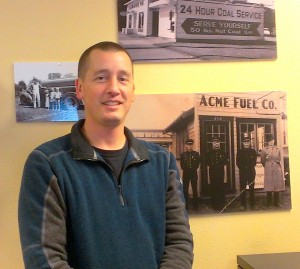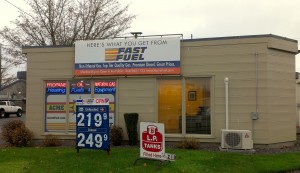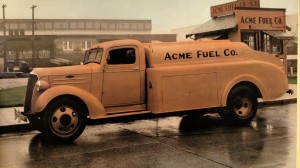Up until the last few decades most gasoline did not contain ethanol, the fuel and engine additive derived from corn within the U.S. But by 2005 America was the world’s largest producer of ethanol and government subsidies made it harder to sell pure gasoline and stay in business, says Acme Fuel/Fast Fuel Vice President and General Manager Christophe Allen. “The price of non-ethanol gas started getting higher and higher,” he says.
The Olympia company had sold non-ethanol gas since it opened its first gas station in 1986, but now the cost was getting too steep. “Finally we decided we couldn’t buy and sell pure gas for the same price as someone who is selling ethanol gas because we can’t compete on that basis,” says Allen. At that point, two of Acme’s major customers put in a request. “J & I Power Equipment and U.S. Marine Sales both said, ‘Please keep at least one product with no ethanol because it’s so bad for engines,’” he says.

Allen started to research the product and what he learned convinced him that they should keep at least one non-ethanol option available. Acme opted for a mid-grade fuel, but word of mouth spread rapidly and it became so popular that they decided to add premium gasoline at both their Olympia and Lacey locations. In the spring of 2016 Acme will be tearing down and rebuilding their Olympia station and will begin offering three grades of non-ethanol fuel, three grades of ethanol fuel, and diesel. “I wouldn’t be surprised if we’re one of the first stations in the country to do something like this,” says Allen.
The decision has made a difference for their commercial clients. “It’s been huge for our customers because ethanol is so hard on small engines,” says Angela Longnecker, head of Marketing and Community Relations at Olympia J & I. “People were coming in with a lot of carburetor and fuel injection issues.”
In particular, she says, people wanted to make sure their equipment would be reliable in an emergency like a flood or power outage. “We use non-ethanol in all of our equipment,” she says. “Removing it takes out some of that worry factor.”

At U.S. Marine in Olympia, owner Paul Degler had also started to notice more customers coming in with engine problems. “For a long time ethanol gas was all that was available,” he says. “Our clients became aware of it because their boats had issues with corrosion. Running non-ethanol fuel in marine engines is a huge advantage. We use it in all of our products because it’s a better grade of fuel.”
Aside from its impact on engines, ethanol creates other challenges, says Allen. He compares it to biodiesel, which Acme used to sell until the price became prohibitive for everyone except its staunchest advocates. “When you calculated the life cycle of all the energy it takes to grow it, refine it, produce it, sell it to the end user, most studies showed that biodiesel had a net positive effect. The growing of the crops could actually take more carbon from the air than was put back,” he says.
Ethanol is the opposite, according to Allen. “You’re better off burning pure gasoline because the life cycle of ethanol takes so much energy and so much corn out of the food stock,” he says. “With its lower energy content, it’s a net negative.”

Although the price difference between ethanol and non-ethanol fuel remains significant, demand remains high in Thurston County. “People don’t just want it, they need it because the ethanol will literally destroy their equipment or engines,” he says.
Acme mostly sells non-ethanol gas to landscaping companies and private clients who have their own yard equipment, boats, or high-performance motorcycles or cars. Gas mileage is an important factor. “Any car actually gets three or four miles per gallon better fuel economy with non-ethanol,” says Allen. “That’s a big reason for a lot of people. Even though it costs more, it’s kind of a wash because they don’t spend as much time filling up.”
At J&I the issue has created an opportunity to educate clients about the benefits of non-ethanol gas and where they can buy it. “We’re a local family owned business and we like to support the same type of businesses,” says Longnecker. “We send a ton of business Acme’s way. Ninety percent of our customers go there, so it’s a win-win situation for everyone.”
For more information about Acme Fuel/Fast Fuel, visit www.acmefuel.com or call 360.943.1133.
Sponsored




















































